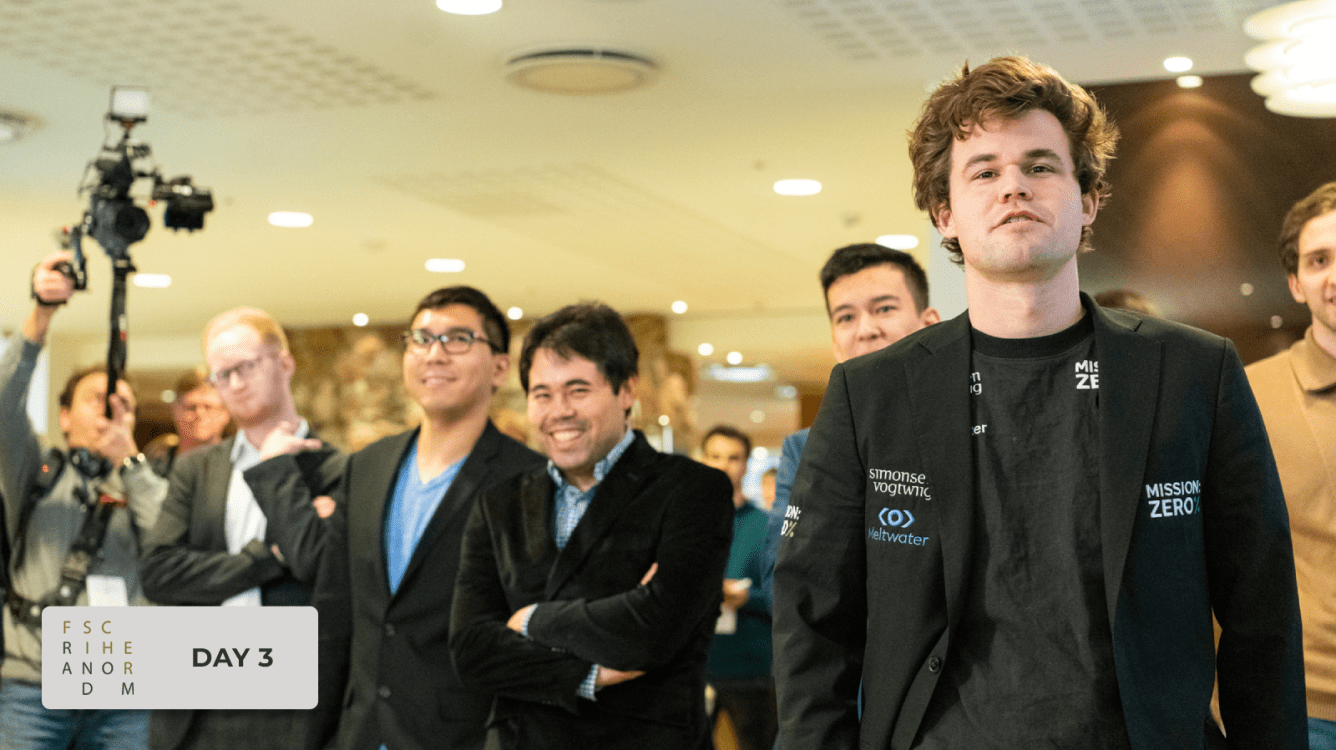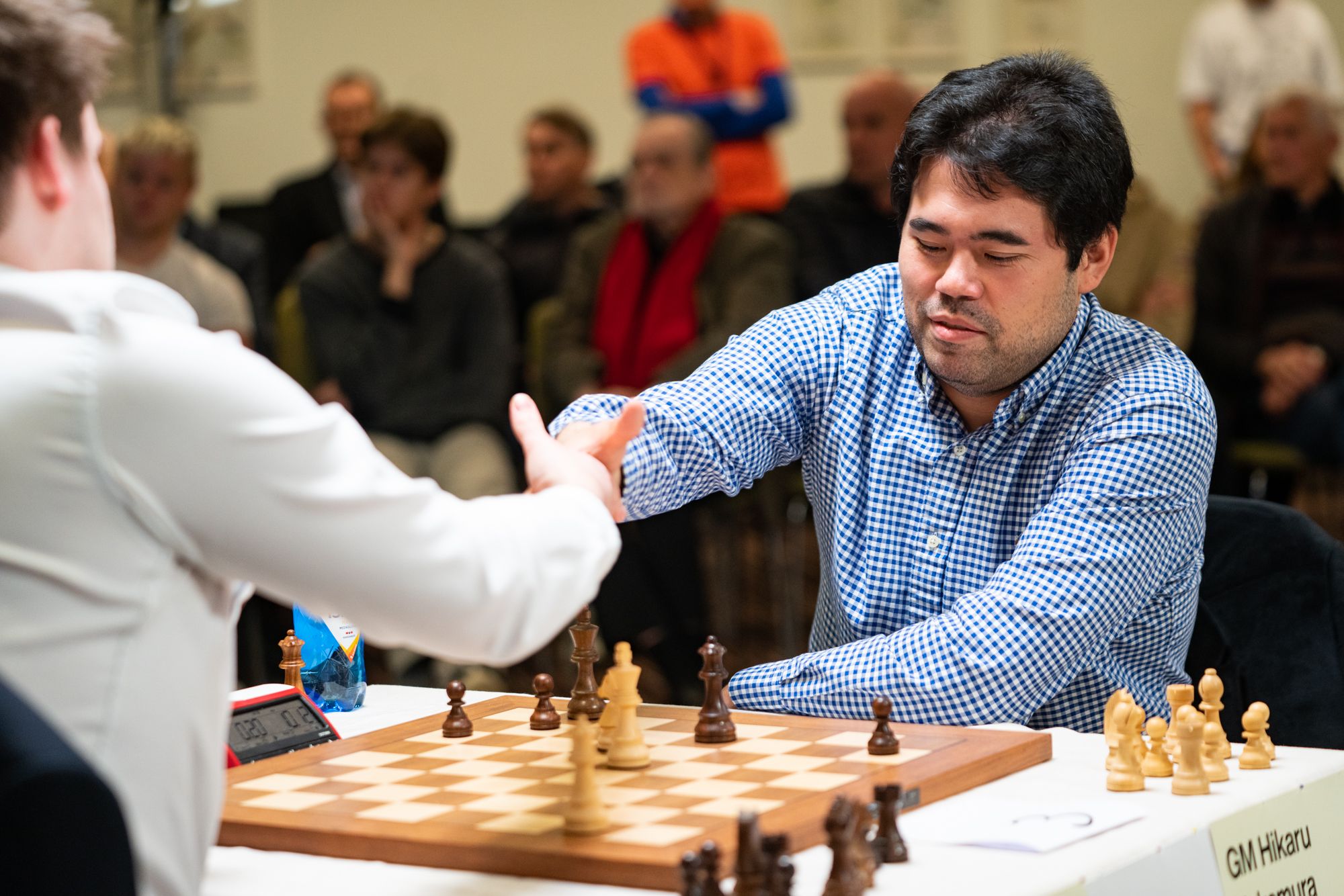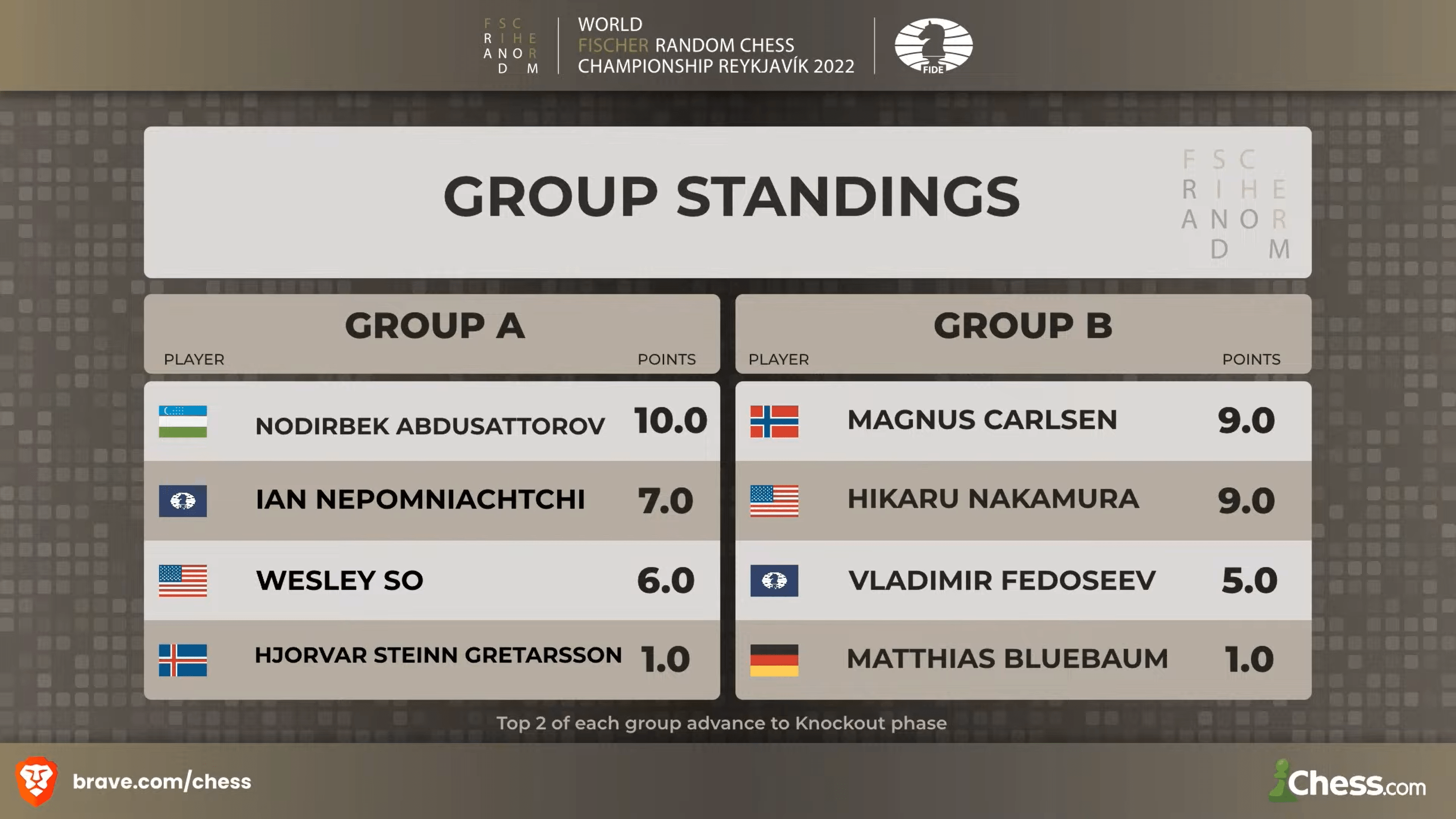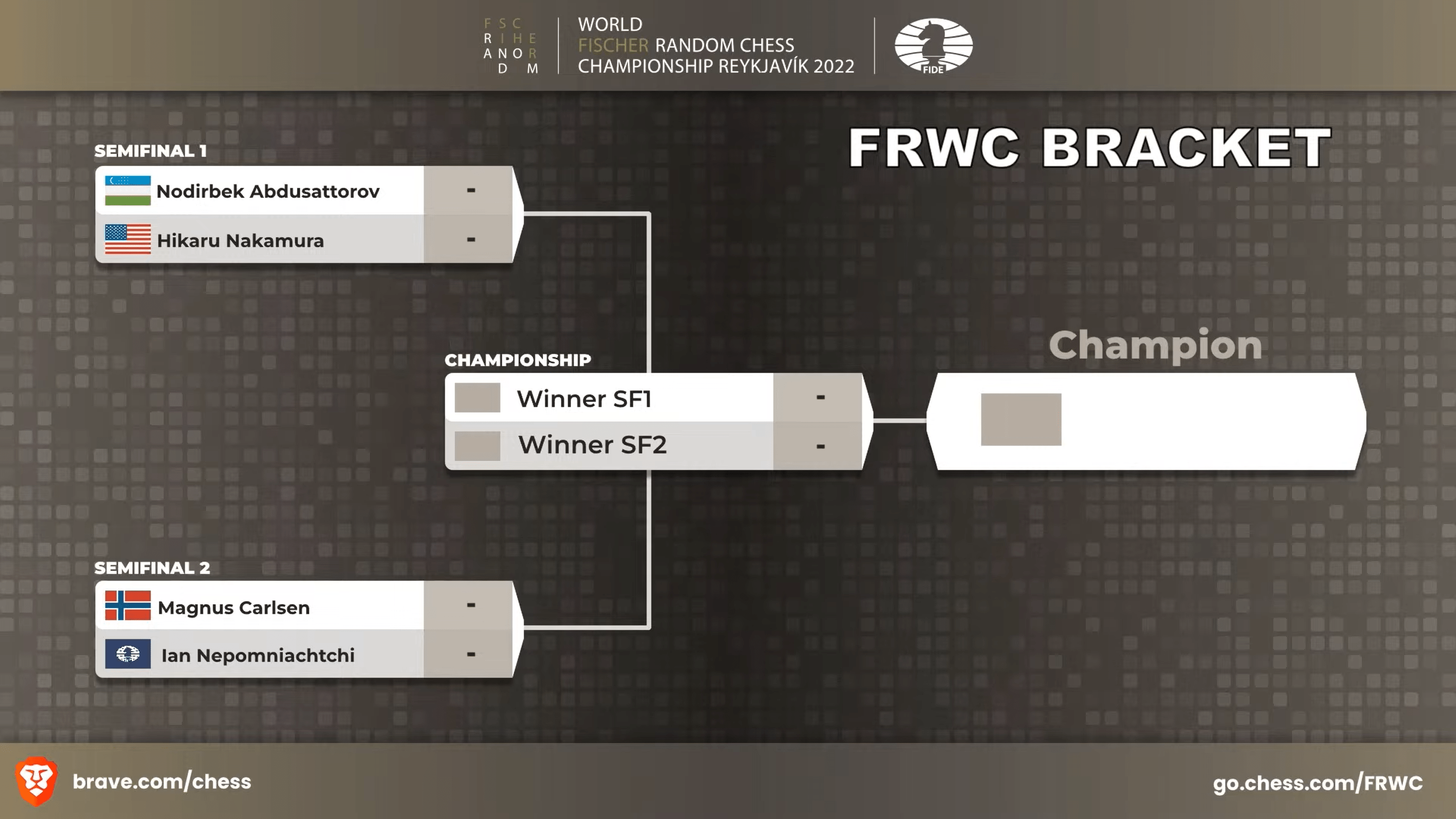
Fischer’s Vision Alive In Reykjavik: Abdusattorov, Carlsen On Top
On June 19, 1996, GM Bobby Fischer, hoping to enhance the creative potential of chess, announced a variant he saw as the future of the game, Fischer Random. Twenty-six years later on the 50th anniversary of his world championship victory in Reykjavik, the city where he captured the title, Fischer’s vision is alive and well.
The 2022 Fischer Random World Championship has been loaded with creativity, dynamic play, and spirited competition. On one side of the scoreboard is GM Nodirbek Abdusattorov, an 18-year-old who has so far outplayed some of the top players in the world in this imaginative variant, finishing in clear first of Group A. On the other side is GM Magnus Carlsen, the classical chess world champion, finishing at the top of group B.
These two incredible competitors along with GM Ian Nepomniachtchi and GM Hikaru Nakamura―second-place finishers for their respective groups―will now meet for the finals knockout, beginning on Saturday.
The knockout stage starts on October 29, starting at 8 a.m. PT / 17:00 CEST.
You can watch the 2022 Fischer Random World Championship on Chess.com/TV. You can also enjoy the show on our Twitch channel and catch all our live broadcasts on YouTube.com/ChesscomLive. Games from the event can be viewed on our events page.
The live broadcast hosted by GM Daniel Naroditsky and IM Lawrence Trent.
Amazingly, the first Fischer Random starting position of the day was almost identical to the day before:
Today's Round Five Starting Position
This gives players a rare opportunity to build on their understanding of the similarities while approaching the slight differences with creativity.
Here are the major features:
- Each side has an undefended pawn on the a-file.
- The king and d-rook start in a queenside castled position. If the d8-rook moves, the b8-one can hop over the king as queenside castling to replace it.
- The bishops begin near the center, meaning they aim at the edges.
- The differences from yesterday's position are the queen is in the corner, ready to aim down the longest diagonal, and the g8-knight starting on its regular square.
- These changes bring the computer evaluation to +0.16, slightly closer to equal.
The queens beginning on the long diagonal seemed to speed up the tactical nature of the position in many games. Abdusattorov defeated Nepomniachtchi in just 31 moves in a highly dynamic game.
This victory vs. his closest competitor clinched the top spot in group A for Abdusattorov―guaranteeing that he advance to the knockout stage―with three games remaining.

Tactical play also dictated the finish to GM Vladimir Fedoseev vs. Carlsen. As the world champion pressed a winning queen and rook ending, Fedoseev found a crafty trick.
Even more shockingly, GM Wesley So vs. GM Hjorvar Gretarsson finished with mate on the board.
With Abdusattorov's own hand at the white pieces in the same position, we see an absolutely magical usage of the Fischer Random rules to turn the game around.
The round-six starting position, the final one for this stage, evoked similarities to the round-four position with just the c-rook and f-knight switched:
Yesterday's Round Four Starting Position
Today's Round Six Starting Position
This one change makes a big difference to the computer evaluation, which is +0.05―the closest to equal that we've seen in this phase. Here are the other major features:
- There are no undefended pawns.
- The king begins in kingside-castled position. Will players castle kingside to hop the h-rook towards the center or play h4/h5 to activate it?
- The a-bishop aims down the longest diagonal, beckoning for the b-pawn to move and open the bishop's gaze towards the enemy king on the other side of the board.
- The commentators strongly favored 1.b4 or 1.b3 as possible first moves.
How did these elite players choose to open the game? Take a guess at Carlsen's move one and Nakamura's reply:
Check out the full game from the wild opening to the incredible fighting chess in the middlegame and endgame of our Game of the Day, Carlsen vs. Nakamura.
I'm happy for the chance to review Fischer Random games, a variation of chess that I love and would like to see become more popular. I've already had the chance to play in two such tournaments and I have to say I had a lot of fun in both cases. The first was at the traditional Open tournament in Mainz, Germany, in 2006. The second time was in Reykjavik itself, in 2019, when I was invited to play in the Icelandic Championship and even won the tournament. To this day my friends have trouble understanding when I say I was the "Icelandic Champion in Fischer Random."
This draw tied the match, securing the top two spots of Group B for Carlsen and Nakamura. The two rivals tied with nine match points each, and Carlsen came out ahead in the tiebreaker, individual game points.

Unlike Carlsen and Nakamura, Nepomniachtchi and Gretarsson preferred to steer the game into regular chess territory.
With this victory, Nepomniachtchi secured second place in group A.
Though So just missed qualification for the next stage, finishing a match point behind Nepomniachtchi, the defending champion was the only player to score a victory against Abdusattorov in the entire round robin.
Group Stage Final Standings

Knockout Bracket

The Fischer Random World Championship, brought to you by the Government of Iceland and the City of Reykjavik, gathers top players worldwide to compete in a series of classical Fischer Random games for their share of the $400,000 prize fund and the title of FIDE Fischer Random World Champion. Fischer Random (also known as Chess960) is a chess variant where all standard chess rules are the same, except for the starting position of the pieces, which can be in one of 960 semi-random setups. Heavily endorsed by the 11th world champion GM Bobby Fischer, the variant sidesteps opening preparation to highlight players' true understanding of chess.
Previous coverage
- Opening Theory in Fischer Random?! Abdusattorov Leads, Carlsen Catches Nakamura
- The Winding Wonderland of Fischer Random: Abdusattorov, Nakamura Lead
- Opening Understanding vs. Counterstrike Ability: Bluebaum Defeats Navara
- Quadruple Queens And Raining Rooks: Bluebaum, Navara Advance To Final
- IM Pranav Overtakes GMs in Second Fischer Random Swiss
- Fedoseev Triumphs In An 'Absolutely Different World'
- Hansen Dances to 4-0, Fedoseev Fights to Final
- Sevian Refuses Last-Round Draw Offer, Wins Fischer Random Swiss
- Announcing The 2022 FIDE Fischer Random World Chess Championship



